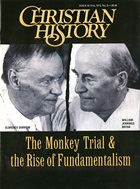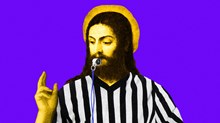On day three, when Judge Raulston asked Reverend Stribling to open with prayer, Darrow interrupted: "Seeing that … the nature of this case being one where it is claimed by the State that there is a conflict between science and religion … we object to the opening of the court with prayer."
The prosecution countered, "We, for the State, think it is quite proper to open the court with prayer … and such an idea extended by the agnostic counsel for the defense is foreign to the thoughts and ideas of the people who do not know anything about infidelity and care less."
Defense attorney Arthur Hays complained, "May I ask to enter an exception to the statement, 'agnostic counsel for the defense'?"
The judge replied, "Gentlemen, do not turn this into an argument," and agreed to let the prayer be said.
That afternoon, Hays, over the prosecution's objections, read a petition from a group of ministers: "We, the following representatives of various well-known religious organizations and synagogues, do hereby petition Your Honor that, if you continue your custom of opening the daily sessions … with prayer, you select the officiating clergymen from among other than fundamental churches . … There are many to whom the prayers of the fundamentalists are not spiritually uplifting and are occasionally offensive . … It seems only just and right that we should occasionally hear a prayer which requires no mental reservations on our part."
The petition was signed by two Unitarian ministers, one rabbi, and one Congregational minister.
Hays made a motion for the court to hear prayers by "men who think that God has shown his divinity in the wonders of the world, in the book of nature, quite as much as in the book of the revealed Word."
The judge said he would refer the petition to the local pastors' association of Dayton, and the courtroom erupted into laughter and applause.
Copyright © 1997 by the author or Christianity Today/Christian History magazine.
Click here for reprint information on Christian History.

Support Our Work
Subscribe to CT for less than $4.25/month




























